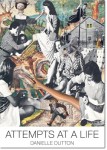With hidden noise reviews Danielle Dutton’s Attempts at a Life:
The first story in this book, “Jane Eyre,” effectively rewrites that novel as if it had been written by Robert Walser, with the short sentences, friendly appeal to the reader, and self-abasement of his narrators. It’s an exercise in compression: 400 pages become five and a half. Brontë’s book is rendered strange and unfamiliar. One realizes that the opposite process could be applied, and Walser’s short stories could be stretched out to become novels: but a good deal of Walser’s charm comes from his compression: The Assistant and especially The Tanners suffer in comparison to the magic of his shorter works. From the first paragraph, covering the first few chapters of the novel:
I read a lot early in life, and seriously craved love, but was accused of being a liar by my own family and set away to learn to sell my soul to the Lord, and also to knit. Abandoned at school, I befriended an extraordinary girl who soon died like a martyr in a series of consumptive fits. Small but a natural watcher, I lived on through that season of death to learn to speak French and to draw. (p. 3)
This is very funny, of course (the dangling “and also to knit” threatening to tip over the sentence); but the Jane Eyre narrating this story is a very different person from the one who narrates the novel, who couldn’t be imagined telling her story in this way. This much compression implies distance – be it ironic or damaged – a comprehension of one’s life as a written thing. It’s not by accident that one of the few details of Jane Eyre’s early life given above is how much she read: these are bookish pieces, as one might expect from a story rewriting a novel in the voice of another writer. A section named “Some Sources” at the end suggests that Robert Duncan’s “An African Elegy” feeds into “Jane Eyre”; the lines quoted in the poem describe Virginia Woolf, who isn’t mentioned directly in the notes. This is a story, one senses, about the way in which a life can be told; this comes through in the content of the story (a canonical story about the subjection of a woman) but more strongly through the style of the story, in the way that it scrutinizes how women write and are written about.
An argument could be made that these pieces are prose poetry, but there’s an emphasis on narrative that isn’t usually stressed so much in prose poetry. But like prose poetry (I’m thinking of Mallarmé), this is a firmly written language: they couldn’t really exist in spoken form, because they have to exist on the page….
See also: Attempts at a Life and all posts tagged Danielle Dutton.
